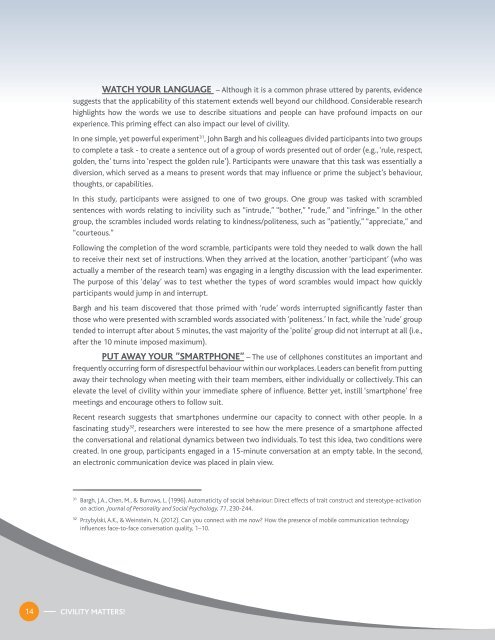CIVILITY MATTERS!
civility report - eng
civility report - eng
You also want an ePaper? Increase the reach of your titles
YUMPU automatically turns print PDFs into web optimized ePapers that Google loves.
WATCH YOUR LANGUAGE – Although it is a common phrase uttered by parents, evidence<br />
suggests that the applicability of this statement extends well beyond our childhood. Considerable research<br />
highlights how the words we use to describe situations and people can have profound impacts on our<br />
experience. This priming effect can also impact our level of civility.<br />
In one simple, yet powerful experiment 31 , John Bargh and his colleagues divided participants into two groups<br />
to complete a task - to create a sentence out of a group of words presented out of order (e.g., ‘rule, respect,<br />
golden, the’ turns into ‘respect the golden rule’). Participants were unaware that this task was essentially a<br />
diversion, which served as a means to present words that may influence or prime the subject’s behaviour,<br />
thoughts, or capabilities.<br />
In this study, participants were assigned to one of two groups. One group was tasked with scrambled<br />
sentences with words relating to incivility such as “intrude,” “bother,” “rude,” and “infringe.” In the other<br />
group, the scrambles included words relating to kindness/politeness, such as “patiently,” “appreciate,” and<br />
“courteous.”<br />
Following the completion of the word scramble, participants were told they needed to walk down the hall<br />
to receive their next set of instructions. When they arrived at the location, another ‘participant’ (who was<br />
actually a member of the research team) was engaging in a lengthy discussion with the lead experimenter.<br />
The purpose of this ‘delay’ was to test whether the types of word scrambles would impact how quickly<br />
participants would jump in and interrupt.<br />
Bargh and his team discovered that those primed with ‘rude’ words interrupted significantly faster than<br />
those who were presented with scrambled words associated with ‘politeness.’ In fact, while the ‘rude’ group<br />
tended to interrupt after about 5 minutes, the vast majority of the ‘polite’ group did not interrupt at all (i.e.,<br />
after the 10 minute imposed maximum).<br />
PUT AWAY YOUR ”SMARTPHONE” – The use of cellphones constitutes an important and<br />
frequently occurring form of disrespectful behaviour within our workplaces. Leaders can benefit from putting<br />
away their technology when meeting with their team members, either individually or collectively. This can<br />
elevate the level of civility within your immediate sphere of influence. Better yet, instill ‘smartphone’ free<br />
meetings and encourage others to follow suit.<br />
Recent research suggests that smartphones undermine our capacity to connect with other people. In a<br />
fascinating study 32 , researchers were interested to see how the mere presence of a smartphone affected<br />
the conversational and relational dynamics between two individuals. To test this idea, two conditions were<br />
created. In one group, participants engaged in a 15-minute conversation at an empty table. In the second,<br />
an electronic communication device was placed in plain view.<br />
31<br />
Bargh, J.A., Chen, M., & Burrows, L. (1996). Automaticity of social behaviour: Direct effects of trait construct and stereotype-activation<br />
on action. Journal of Personality and Social Psychology, 71, 230-244.<br />
32<br />
Przybylski, A.K., & Weinstein, N. (2012). Can you connect with me now? How the presence of mobile communication technology<br />
influences face-to-face conversation quality, 1–10.<br />
14<br />
<strong>CIVILITY</strong> <strong>MATTERS</strong>!


